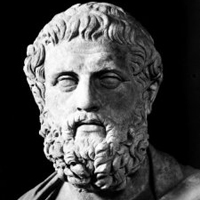Themes in Sophocles' Antigone
Antigone by Sophocles deals with the varieties of themes, giving the drama a possibility of diverse interpretations. The major themes found in this drama are, rivalry between sisters, pride, the position of woman as a gender, individual versus state, conscience versus law, divine law versus human law which are described below.

Sophocles
Rivalry between Sisters
In Antigone, the two sisters Antigone and Ismene are projected as foils and rivals. The main female character Antigone is thin, moody, stubborn, bold and manly. But opposite to her, her sister Ismene is reasonable, timid, obedient, plump and beautiful in looks. When Antigone proposes a plan to bury her brother Polynices against the decree of the dictator, Creon, Ismene cannot take a strong position. She fears the man-made law and cannot give full support to the moral duty of her sister Antigone. Her timid nature and feminine quality dominate her and she steps back. But, as Antigone is bold and stubborn in her decision, she takes her stand for the sake of her family and she does not fear the man-made law but the divine law. Because of this reason, the two sisters now become rivals in terms of beliefs and supports to the laws.
Pride
Pride is the characteristics of the characters in Sophocles’ plays due to which the main protagonists get punishment from the god without any mercy and have to face the deadly fall. In the context of Antigone, Creon is given the dangerous pride which influences him to make a new law that substitutes the divine law. He is so blind in belief that the law he has made is the same divine law, but he has forgotten the fact that none can make the law equal to divine law or greater than divine law. His punishment law that he has made for Polynices is against gods’ law. He is reminded by the blind seer that the gods are with Antigone, but still he does not feel fear of the gods because of his pride that whatever he is doing is right. Because of the same pride, he has to lose all his family members. He is ruined with the excess pride he carries with him.
Individual versus State; Conscience versus Law; Divine Law versus Human Law
Antigone’s prime issue of conflicts is these three sets of pairings. Antigone, the strong lady, stands for the individual, conscience and divine law, whereas Creon, the new king of Thebes, stands for the state, law and human law. As an individual Antigone is morally obliged to give proper burial to her brother to whom the state has denied the burial. Her conscience urges her to do what is right not to follow what other says is right. She believes that according to divine law too, any human being on the earth must be given funeral right after the death. So, she is bold and stubborn enough to carry out her mission to bury her brother. On the other side, Creon, the newly appointed king of Thebes, tries to establish his authority as supreme and makes his own law disobeying gods’ law. As a king, he has to set rules to keep order and peace in the state, but at the same time must not forget the divine law. But he trespasses the law and denies the burial to Polynices and orders to kill Antigone. Creon’s need to defeat Antigone anyhow sometimes seems to be too personal: to maintain his pride, his kingship, his power and more basically to maintain his manhood.
Gender: the Position of Women
The position of women from the ancient time is always thought to be the lowest. In the case of Greek women, the freedom is limited and there are set rules and regulations for them to behave in the society. In such confined society and time, Antigone takes a strong stand for a good cause challenging the then social values and rules. Her rebellion is threatening as it is against the gender role set by the men and the hierarchy made by the same men in their favor. She rejects to be passive and follow whatever the men say. Her rejection of the law, especially the man, Creon has been problematic. Antigone’s sister Ismene is timid and for her men are stronger so they must be followed. She represents the typical Greek women who are passive and does not bother to take any risks for the good cause and does not have any sense of freedom. Creon has a mindset that even if he was wrong, he cannot be defeated by a woman, so anyhow he has to defeat woman. This thought is gender bias from modern feminist point of view.
Antigone Study Center
Dramatic Irony in Sophocles' Antigone
Human Law and Law of God in Antigone
 |
bachelorandmaster.com |